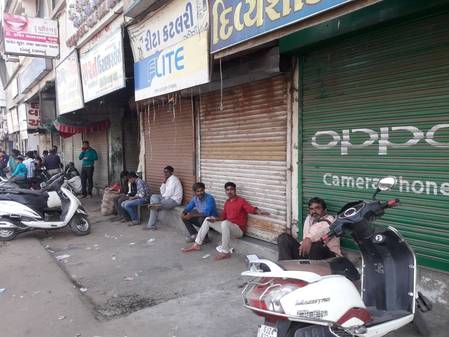
Ahmedabad: Fair price shops across Gujarat have remained shut since June 1, as ration shopkeepers launched a statewide strike against the government’s mandatory E-KYC policy for ration card holders.
The closure has disrupted Public Distribution System (PDS) services, leaving thousands of beneficiaries, particularly the poor and rural populations, without access to essential food grains.
The Gujarat Fair Price Shops and Kerosene License Holders Association called for the strike, calling the new requirement “unjust and impractical,” especially for those in remote areas with limited access to digital infrastructure.
The All Gujarat Fair Price Shop Association, representing nearly 15,000 ration shop owners, has also joined the protest, intensifying the pressure on the state government.
Shopkeepers are demanding the rollback of the E-KYC mandate and a revision of the existing commission structure. They have urged the government to increase the commission from Rs 1.50 to Rs 3 per kilogram of grain distributed.
Additionally, they want the eligibility criteria for the Rs 20,000 monthly commission, currently given only if 97 per cent of the grain is distributed, to be relaxed to 93 per cent.
As the strike entered its second day, several PDS customers in Ahmedabad were seen returning home empty-handed.
“I came all the way from Vejalpur. This is the third or fourth time. We poor people need grain to survive,” said one visibly distressed beneficiary, frustrated by repeated failed attempts to collect ration supplies.
The E-KYC rule has been in effect since May 13, resulting in ration being denied to thousands who haven’t completed the verification.
For many in rural areas, digital literacy and connectivity remain major hurdles, making the new policy difficult to comply with. Fair Price Shops (FPS) form the backbone of Gujarat’s Public Distribution System (PDS), serving as the primary channel through which subsidised food grains and essential commodities reach the economically weaker sections of society.
As of 2024, Gujarat has over 17,000 fair price shops, catering to nearly 3.75 crore beneficiaries under the National Food Security Act (NFSA). These shops distribute staples such as wheat, rice, sugar, and kerosene at highly subsidised rates to Antyodaya (AAY) and Priority Households (PHH).
Each FPS is typically allotted to a licensed dealer, often in semi-urban or rural areas, and is monitored by the state’s Food, Civil Supplies, and Consumer Affairs Department.
In Gujarat, the fair price network has also played a crucial role in disaster relief, COVID-era food aid programs, and the implementation of schemes like One Nation One Ration Card (ONORC), allowing migrants to access their entitlements anywhere in the state or country.
Despite this critical role, fair price shop owners have expressed concerns about operational challenges, including low commission rates, stringent distribution targets, and increasing digital compliance burdens such as mandatory E-KYC.
In rural pockets with limited internet access, such requirements have strained the already thin margins and infrastructure of FPS dealers. This has led to periodic protests, such as the current statewide strike in 2025, with shopkeepers demanding both policy revision and financial support.
